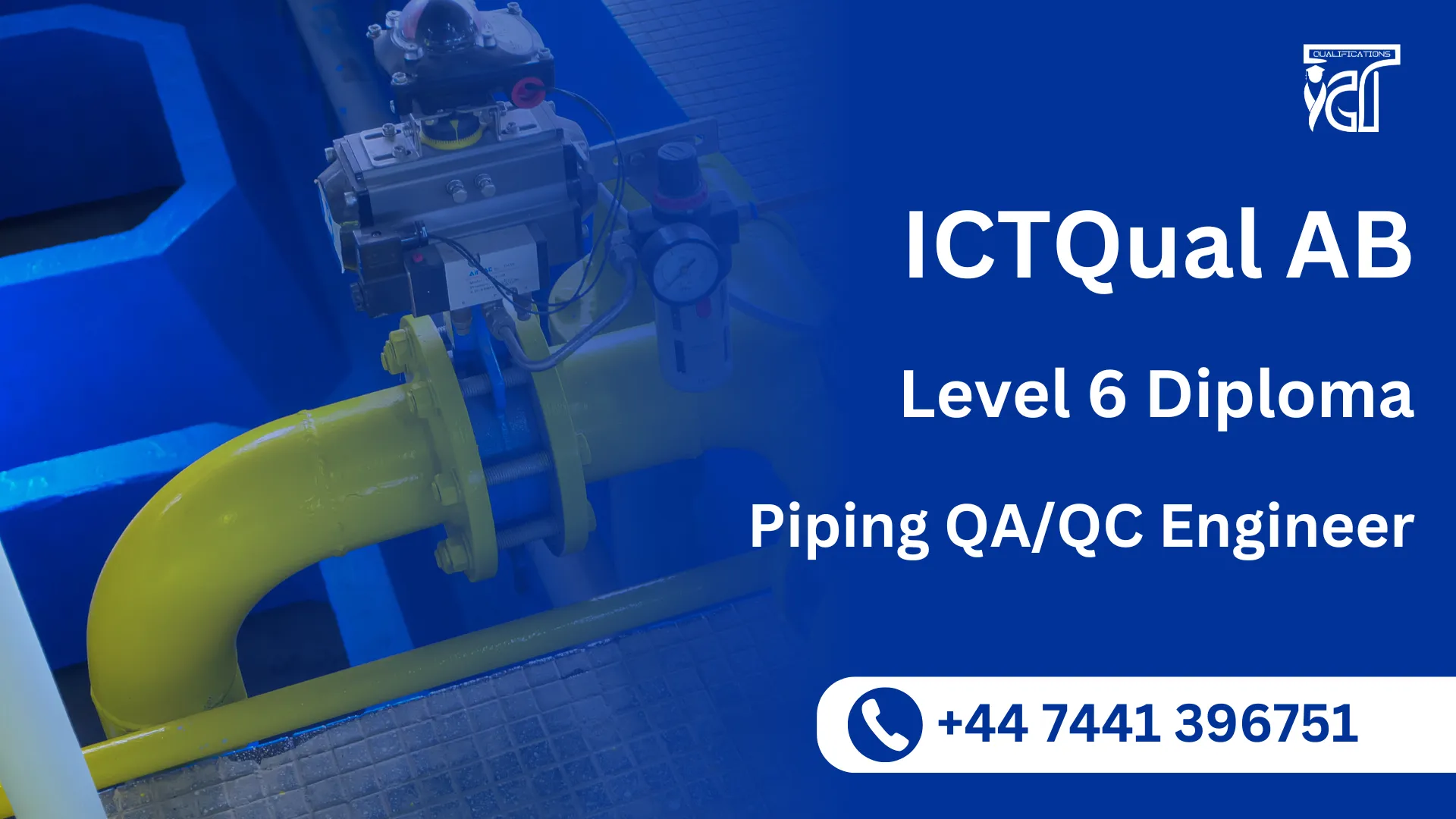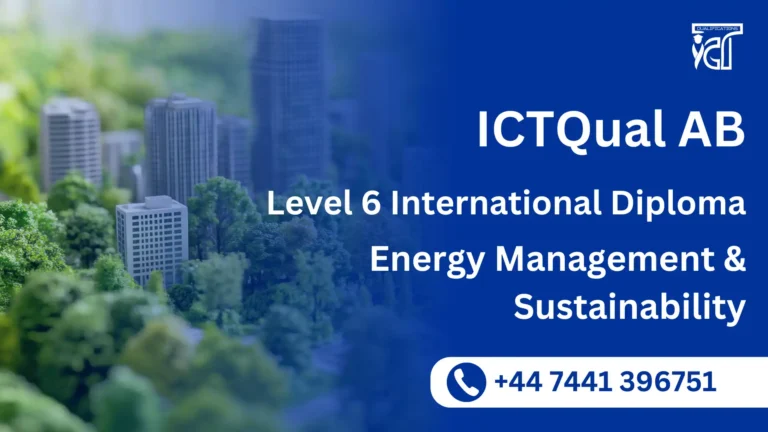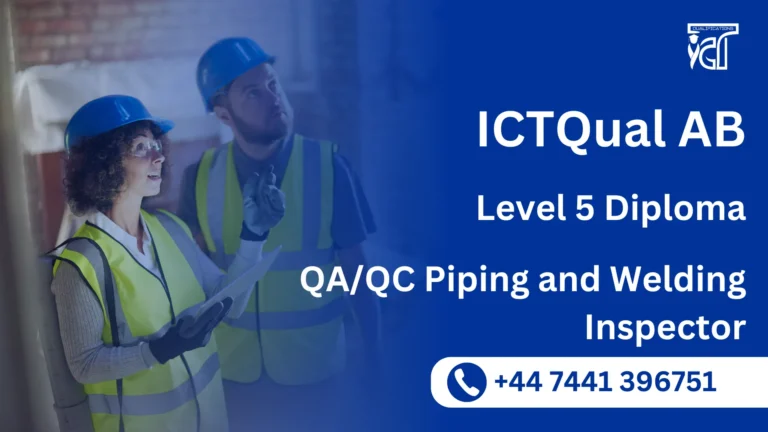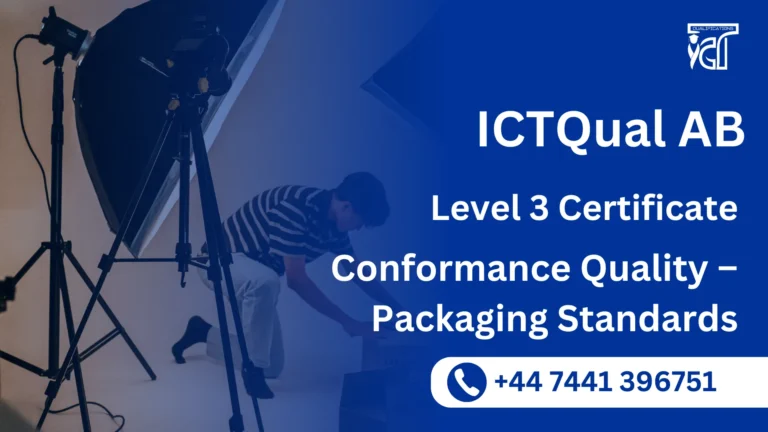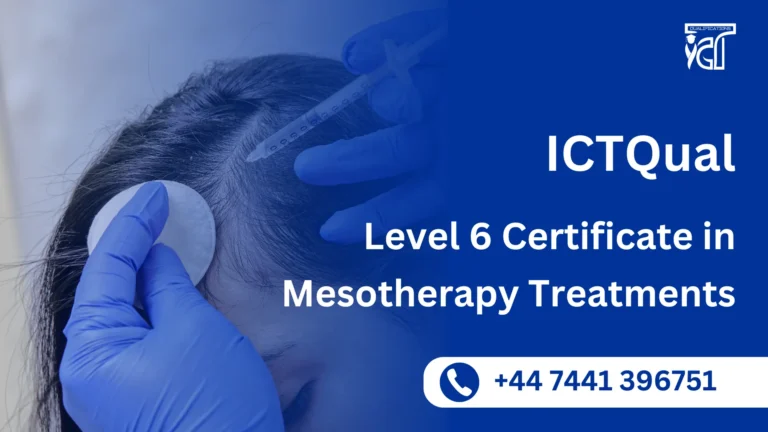The ICTQual AB Level 6 Diploma in Piping QA/QC Engineer is an advanced qualification tailored for professionals aiming to master the principles and practices of quality assurance and quality control in piping engineering. This program is structured to provide a deep understanding of international standards, inspection methodologies, and compliance frameworks that govern piping systems across diverse industrial sectors.
Learners are guided through the complete lifecycle of piping projects, from design review and material selection to fabrication, welding, installation, and final inspection. Emphasis is placed on the application of QA/QC procedures, documentation control, and adherence to codes such as ASME, API, and ISO. The course also integrates modern approaches to non-destructive testing (NDT), risk assessment, and safety management, ensuring participants are equipped to uphold the highest standards of reliability and integrity in engineering projects.
Beyond technical knowledge, the diploma develops analytical and managerial skills essential for supervising inspection teams, coordinating with project stakeholders, and implementing quality systems that minimize errors and maximize efficiency. Learners gain practical insights into resolving real-world challenges, such as identifying defects, ensuring compliance with contractual specifications, and maintaining traceability of materials and processes.
ICTQual AB Level 6 Diploma in Piping QA/QC Engineer
This qualification, the ICTQual AB Level 6 Diploma in Piping QA/QC Engineer, consists of 6 mandatory units.
| Sr# | Unit Title |
| 1 | Integrated QA/QC Strategies in EPC (Engineering, Procurement, Construction) Projects |
| 2 | Advanced Material Selection and Corrosion Control Techniques |
| 3 | Quality Control Planning and Inspection Scheduling |
| 4 | Multi-Stage Piping System Testing and Quality Verification |
| 5 | Contractor and Vendor Quality Surveillance and Evaluation |
| 6 | Regulatory Compliance and Legal Aspects in Piping QA/QC |
Learning Outcomes for the Study Units:
Integrated QA/QC Strategies in EPC Projects
- Develop integrated QA/QC strategies tailored to Engineering, Procurement, and Construction (EPC) workflows.
- Design Project Quality Plans (PQPs) and Inspection Test Plans (ITPs), incorporating ISO-based quality control and audit protocols.
- Coordinate quality processes across engineering, procurement, fabrication, and installation phases.
Advanced Material Selection and Corrosion Control Techniques
- Evaluate suitable piping materials based on mechanical properties and anticipated corrosion resistance.
- Apply best-practice corrosion control techniques informed by material science principles.
- Recommend appropriate coatings or inhibitors to extend piping system life in aggressive environments.
Quality Control Planning and Inspection Scheduling
- Plan and schedule QA/QC inspection activities to align with project timelines and avoid delays.
- Use inspection scheduling tools—such as critical path analysis—to balance time, cost, and quality controls.
- Ensure inspection plans support compliance with regulatory and client requirements.
Multi‑Stage Piping System Testing and Quality Verification
- Design and implement multi-stage testing procedures including pressure testing, pneumatic and hydrostatic methods.
- Interpret test data to verify system integrity, detect leaks, and identify quality deviations.
- Generate quality verification reports that meet project and international standards.
Contractor and Vendor Quality Surveillance and Evaluation
- Monitor and evaluate supplier and contractor QA/QC performance through site inspections and audits.
- Review vendor documentation and ITPs to ensure alignment with project quality requirements.
- Develop corrective action plans for performance deviations and manage supplier quality data.
Regulatory Compliance and Legal Aspects in Piping QA/QC
- Interpret and apply legal requirements and international codes to inspection and QA/QC processes.
- Ensure compliance with contractual obligations, code standards, and audit findings.
- Support resolution of non-conformance issues through documentation, root cause analysis, and corrective actions.
The ICTQual AB Level 6 Diploma in Piping QA/QC Engineer offers learners a strong platform to advance their expertise in quality assurance and quality control for piping systems. This program is designed to provide both technical depth and practical application, ensuring participants are well-prepared to meet industry demands and progress in their careers.
1. Technical Knowledge and Standards
- Comprehensive understanding of QA/QC principles applied to piping engineering.
- In-depth study of international codes such as ASME, API, and ISO.
- Advanced welding inspection techniques for fabrication and installation processes.
- Application of non-destructive testing (NDT) methods to ensure safety and reliability.
- Focus on material selection and compliance with industry specifications.
- Integration of documentation practices for traceability and quality assurance.
2. Practical Industry Application
- Hands-on exposure to inspection procedures across oil, gas, and petrochemical projects.
- Training in fabrication and installation monitoring for piping systems.
- Ability to identify defects and implement corrective measures effectively.
- Experience in managing QA/QC documentation for project compliance.
- Application of safety standards to minimize risks in engineering environments.
- Preparation for real-world challenges faced in large-scale industrial projects.
3. Career Advancement and Recognition
- Qualification aligned with global industry requirements for employability worldwide.
- Enhanced career pathways into senior QA/QC engineering roles.
- Recognition as a skilled professional in piping inspection and quality control.
- Opportunities in oil and gas, construction, and power sectors.
- Strengthened professional credibility through advanced certification.
- Competitive edge in international job markets.
4. Leadership and Professional Skills
- Development of managerial skills to lead inspection teams.
- Improved stakeholder coordination for project success.
- Analytical problem-solving abilities to resolve quality issues.
- Capacity to implement quality systems that enhance efficiency.
- Confidence in supervising complex projects with high safety standards.
The ICTQual AB Level 6 Diploma in Piping QA/QC Engineer is designed for learners who aspire to build advanced expertise in piping inspection, compliance, and quality control. The ideal participant is motivated to combine technical knowledge with practical application, preparing for leadership roles in industries where safety and reliability are paramount.
1. Academic and Technical Background
- Learners with a foundation in engineering or technical studies seeking specialization in piping QA/QC.
- Participants with prior exposure to mechanical or civil disciplines who want to expand into piping systems.
- Individuals familiar with basic inspection or fabrication processes aiming to formalize their skills.
- Candidates with secondary education or equivalent qualifications ready to progress into advanced training.
- Professionals with Level 1 or Level 3 diplomas looking to advance their career pathway.
- Learners with good command of English (recommended CEFR A2 or equivalent) for technical communication.
2. Professional Aspirations
- Aspiring QA/QC engineers who want to specialize in piping systems.
- Inspection professionals seeking to enhance their knowledge of international codes and standards.
- Supervisors or team leaders aiming to strengthen their ability to manage inspection teams.
- Technicians and site engineers who wish to transition into quality-focused roles.
- Learners targeting industries such as oil and gas, petrochemicals, and construction.
- Professionals seeking globally recognized qualifications to boost employability.
3. Skills and Competencies Desired
- Strong analytical mindset to identify defects and resolve quality issues.
- Interest in welding inspection and non-destructive testing (NDT) methods.
- Ability to understand compliance frameworks and apply them to real-world projects.
- Commitment to safety standards and risk management in engineering environments.
- Capacity to manage documentation and traceability for QA/QC processes.
- Willingness to learn advanced inspection techniques and apply them in practice.
4. Personal Qualities and Motivation
- Detail-oriented learners who value precision and accuracy in engineering work.
- Motivated professionals eager to progress into senior QA/QC roles.
- Team players with the ability to collaborate across multidisciplinary projects.
- Problem-solvers who thrive in challenging industrial environments.
- Learners committed to continuous improvement
Completing the ICTQual AB Level 6 Diploma in Piping QA/QC Engineer opens multiple pathways for learners to advance their careers, pursue higher-level qualifications, and specialize further in engineering and quality management. This progression ensures that participants remain competitive in industries where safety, compliance, and technical expertise are critical.
Academic and Professional Development
- Eligibility for advanced diplomas in engineering quality management or project inspection
- Progression to Level 7 qualifications in engineering, QA/QC, or project management
- Opportunity to pursue specialized certifications in welding inspection, NDT, or piping design
- Access to professional memberships in engineering and inspection bodies
- Recognition for further study in technical management or industrial compliance programs
- Foundation for continuous professional development (CPD) in engineering disciplines
Career Pathways
- QA/QC Engineer roles in oil and gas, petrochemical, and construction industries
- Inspection Supervisor positions overseeing fabrication and installation projects
- Project Quality Coordinator opportunities ensuring compliance with international standards
- Consultancy roles advising on piping inspection and quality assurance
- Leadership positions in quality departments of engineering firms
- Global career mobility due to internationally recognized qualification
Industry Specialization
- Advanced expertise in piping systems for complex industrial projects
- Specialization in welding inspection and fabrication monitoring
- Focus on non-destructive testing (NDT) methods for safety-critical applications
- Integration into risk management and compliance frameworks
- Opportunities to work on mega-projects in energy and infrastructure
- Ability to contribute to innovation in QA/QC practices
Long-Term Professional Growth
- Pathway to senior management roles in engineering quality assurance
- Enhanced credibility for international assignments and cross-border projects
- Capacity to mentor and train junior inspectors within organizations
- Potential to transition into academic or training roles in QA/QC engineering
- Strengthened profile for leadership in safety and compliance
- Future readiness for evolving industry standards and technological advancements
Entry Requirements
Learners must meet the following criteria to be considered for admission into the course:
- Age Requirement: Minimum age of 18 years at the time of enrollment
- Educational Background: Completion of a Level 5 Diploma or equivalent technical qualification in engineering or related fields
- Work Experience: Minimum of 2–3 years of relevant industry experience in QA/QC, piping, welding, or inspection
- English Language Proficiency: Good command of English for technical communication and documentation. Recommended proficiency equivalent to IELTS 5.5–6.0 or CEFR B2 level
Register Now
Qualification Process
Qualification Process for the ICTQual AB Level 6 Diploma in Piping QA/QC Engineer
- Self-Assessment:
Begin by evaluating your eligibility to ensure you meet the qualification requirements, including work experience, knowledge, and language proficiency. - Registration:
Complete your registration by submitting the required documents, including a scanned copy of a valid ID, and paying the registration fee. - Induction:
An assessor will conduct an induction to confirm your eligibility for the course and explain the evidence requirements. If you do not meet the criteria, your registration will be cancelled, and the fee will be refunded. - Assignments & Evidence Submission:
Provide all assignments and the necessary evidence based on the assessment criteria outlined in the course. If you are unsure of the required evidence, consult with the assessor for guidance on the type and nature of evidence needed. - Feedback and Revision:
The assessor will review your submitted evidence and provide feedback. Evidence that meets the criteria will be marked as “Criteria Met,” while any gaps will be identified. You will be asked to revise and resubmit if needed. - Competence Evidence:
Submit final evidence demonstrating that all learning outcomes have been met. This evidence will be marked as “Criteria Met” by the assessor once it is satisfactory. - Internal Quality Assurance (IQA):
The Internal Quality Assurance Verifier (IQA) will review your evidence to ensure consistency, quality, and compliance with standards. - External Verification:
The IQA will submit your portfolio to ICTQUAL AB External Quality Assurance Verifiers (EQA) for final confirmation. The EQA may contact you directly to verify the authenticity of your evidence. - Certification:
Upon successful completion of all checks, ICTQUAL AB will issue your official certificate, confirming that you have attained the ICTQual AB Level 6 Diploma in Piping QA/QC Engineer.

